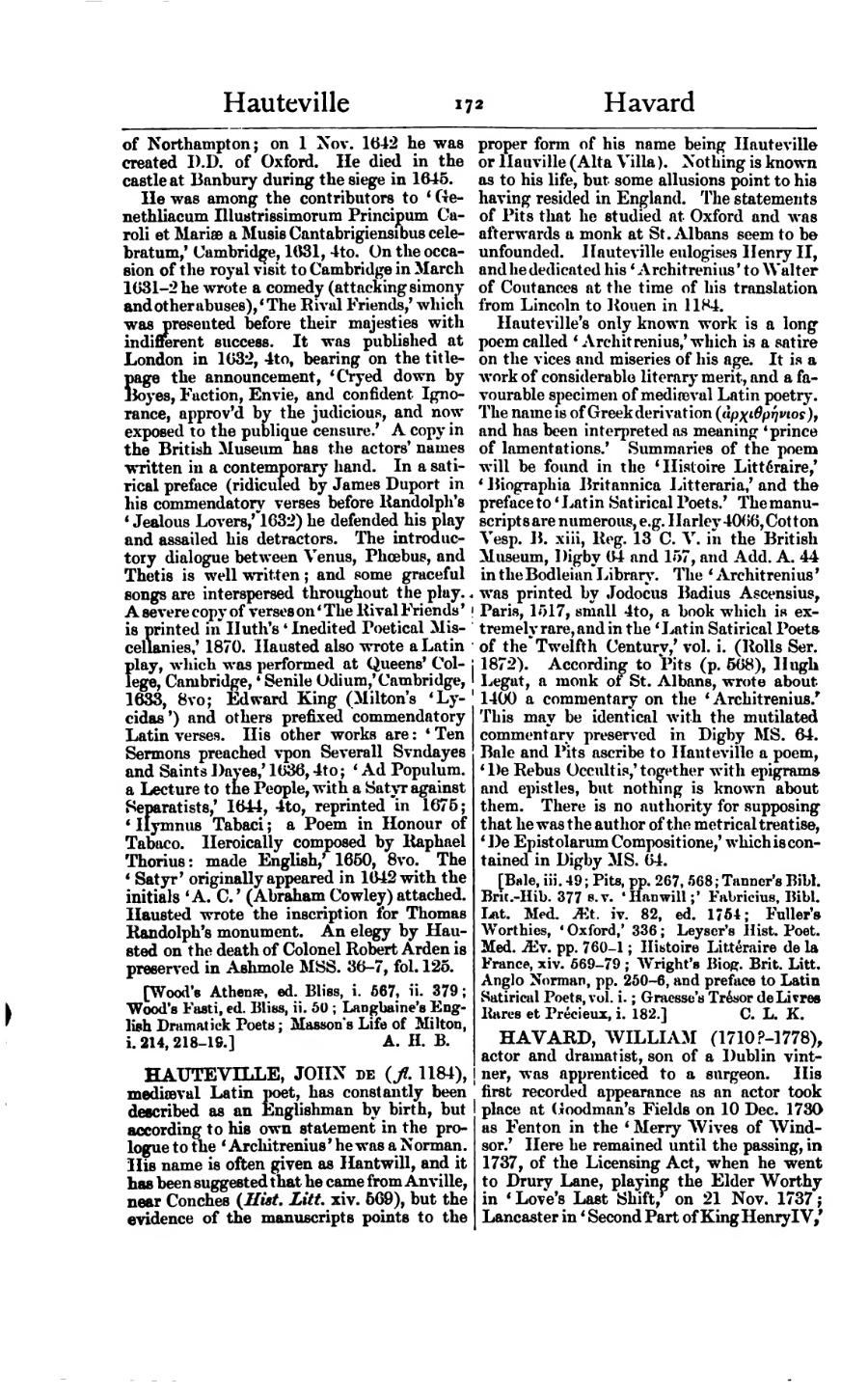of Northampton; on 1 Nov. 1642 he was created D.D. of Oxford. He died in the castle at Banbury during the siege in 1645.
He was among the contributors to ‘Genethliacum Illustrissimorum Principum Caroli et Mariæ a Musis Cantabrigiensibus celebratum,’ Cambridge, 1631, 4to. On the occasion of the royal visit to Cambridge in March 1631–2 he wrote a comedy (attacking simony and other abuses), ‘The Rival Friends,’ which was presented before their majesties with indifferent success. It was published at London in 1632, 4to, bearing on the title-page the announcement, ‘Cryed down by Boyes, Faction, Envie, and confident Ignorance, approv'd by the judicious, and now exposed to the publique censure.’ A copy in the British Museum has the actors' names written in a contemporary hand. In a satirical preface (ridiculed by James Duport in his commendatory verses before Randolph's ‘Jealous Lovers,’ 1632) he defended his play and assailed his detractors. The introductory dialogue between Venus, Phœbus, and Thetis is well written; and some graceful songs are interspersed throughout the play. A severe copy of verses on ‘The Rival Friends’ is printed in Huth's ‘Inedited Poetical Miscellanies,’ 1870. Hausted also wrote a Latin play, which was performed at Queens' College, Cambridge, ‘Senile Odium,’ Cambridge, 1633, 8vo; Edward King (Milton's ‘Lycidas’) and others prefixed commendatory Latin verses. His other works are: ‘Ten Sermons preached vpon Severall Svndayes and Saints Dayes,’ 1636, 4to; ‘Ad Populum. a Lecture to the People, with a Satyr against Separatists,’ 1644, 4to, reprinted in 1675; ‘Hymnus Tabaci; a Poem in Honour of Tabaco. Heroically composed by Raphael Thorius: made English,’ 1650, 8vo. The ‘Satyr’ originally appeared in 1642 with the initials ‘A. C.’ (Abraham Cowley) attached. Hausted wrote the inscription for Thomas Randolph's monument. An elegy by Hausted on the death of Colonel Robert Arden is preserved in Ashmole MSS. 36–7, fol. 125.
[Wood's Athenæ, ed. Bliss, i. 567, ii. 379; Wood's Fasti, ed. Bliss, ii. 50; Langbaine's English Dramatick Poets; Masson's Life of Milton, i. 214, 218–19. ]
HAUTEVILLE, JOHN de (fl. 1184), mediæval Latin poet, has constantly been described as an Englishman by birth, but according to his own statement in the prologue to the ‘Architrenius’ he was a Norman. His name is often given as Hantwill, and it has been suggested that he came from Anville, near Conches (Hist. Litt. xiv. 569), but the evidence of the manuscripts points to the proper form of his name being Hauteville or Hauville (Alta Villa). Nothing is known as to his life, but some allusions point to his having resided in England. The statements of Pits that he studied at Oxford and was afterwards a monk at St. Albans seem to be unfounded. Hauteville eulogises Henry II, and he dedicated his ‘Architrenius’ to Walter of Coutances at the time of his translation from Lincoln to Rouen in 1184.
Hauteville's only known work is a long poem called ‘Architrenius,’ which is a satire on the vices and miseries of his age. It is a work of considerable literary merit, and a favourable specimen of mediæval Latin poetry. The name is of Greek derivation (ἀρχιθρήνιος), and has been interpreted as meaning ‘prince of lamentations.’ Summaries of the poem will be found in the ‘Histoire Littéraire,’ ‘Biographia Britannica Litteraria,’ and the preface to ‘Latin Satirical Poets.’ The manuscripts are numerous, e.g. Harley 4066, Cotton Vesp. B. xv, Reg. 13 C. V. in the British Museum, Digby 64 and 157, and Add. A. 44 in the Bodleian Library. The ‘Architrenius’ was printed by Jodocus Badius Ascensius, Paris, 1517, small 4to, a book which is extremely rare, and in the ‘Latin Satirical Poets of the Twelfth Century,’ vol. i. (Rolls Ser. 1872). According to Pits (p. 568), Hugh Legat, a monk of St. Albans, wrote about 1400 a commentary on the ‘Architrenius.’ This may be identical with the mutilated commentary preserved in Digby MS. 64. Bale and Pits ascribe to Hauteville a poem, ‘De Rebus Occultis,’ together with epigrams and epistles, but nothing is known about them. There is no authority for supposing that he was the author of the metrical treatise, ‘De Epistolarum Compositione,’ which is contained in Digby MS. 64.
[Bale, iii. 49; Pits, pp. 267, 568; Tanner's Bibl. Brit.-Hib. 377 s. v. ‘Hanwill;’ Fabricius, Bibl. Lat. Med. Æt. iv. 82, ed. 1754; Fuller's Worthies, ‘Oxford,’ 336; Leyser's Hist. Poet. Med. Æv. pp. 760–1; Histoire Littéraire de la France, xiv. 569–79; Wright's Biog. Brit. Litt. Anglo-Norman, pp. 250–6, and preface to Latin Satirical Poets, vol. i.; Graesse's Trésor de Livres Rares et Précieux, i. 182.]
HAVARD, WILLIAM (1710?–1778), actor and dramatist, son of a Dublin vintner, was apprenticed to a surgeon. His first recorded appearance as an actor took place at Goodman's Fields on 10 Dec. 1730 as Fenton in the ‘Merry Wives of Windsor.’ Here he remained until the passing, in 1737, of the Licensing Act, when he went to Drury Lane, playing the Elder Worthy in ‘Love's Last Shift,’ on 21 Nov. 1737; Lancaster in ‘Second Part of King Henry IV,’
